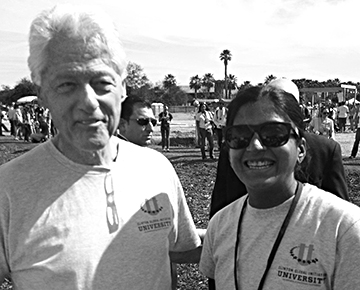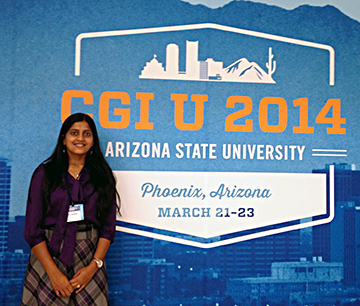Food insecurity is a daily struggle for millions of families in India. In fact, because parents worry every day about their next meal, they aren’t always able to focus on long-term plans such as careers for their children.
 “If we can give them their right, they can dream further. They can dream of an education and a better life,” said Shweta Chopra, a doctoral candidate in Purdue’s College of Technology. She was introduced to food security through the current National Science Foundation research of her doctoral committee chair, Chad Laux, assistant professor of technology leadership and innovation. For the last two years, Chopra and Laux have been studying the introduction of technology into India’s rice supply chain. Her ultimate goal is to improve the way rice is distributed, from the growers to consumers, while eliminating corruption and waste.
“If we can give them their right, they can dream further. They can dream of an education and a better life,” said Shweta Chopra, a doctoral candidate in Purdue’s College of Technology. She was introduced to food security through the current National Science Foundation research of her doctoral committee chair, Chad Laux, assistant professor of technology leadership and innovation. For the last two years, Chopra and Laux have been studying the introduction of technology into India’s rice supply chain. Her ultimate goal is to improve the way rice is distributed, from the growers to consumers, while eliminating corruption and waste.
Chopra’s work has taken her to the Clinton Global Initiative University, to India twice, and across the United States to present her research.
A sampling of Fair Price Shops in the Indian state of Chhattisgarh have begun using a computerized tracking system to distribute subsidized rice and other commodities such as wheat, sugar, salt and kerosene to the state’s poor. Approximately 450 shops in Chhattisgarh (there is 10,000 in the state) are using the updated system. They have provided valuable information about technology training needs, usability of the system and diminished corruption because of better tracking from supplier to customer.
Before technology was introduced into the system, it was paper-based, and there were several points along the supply chain where corruption was the norm. Consumers were required to pick up their commodities at a specific location, which often required many hours of travel and waiting.
The newer system provides real-time tracking of supplies and individualized smart cards for consumers. The cards, which can be used at any Fair Price Shop, help each consumer receive the correct amount of commodities, which is accurately reported back into the system. The portability of service built into the system empowers beneficiaries, Chopra says, and eliminates monopolies by creating competition among the Fair Price Shops.
Chopra’s research on supply chains within the Indian system will help India’s government figure out how to scale up the program to its nearly 5 million Fair Price Shops. The Indian government’s Public Distribution System helps feed 500 million people who have a household income of less than 50 cents a day.
Such a large undertaking doesn’t happen quickly. Chopra’s experience at the Clinton Global Initiative University (CGI) in March 2014 will help her expand her network of supporters and potential collaborators.
In addition to meeting former President Bill Clinton and his family, Chopra was able to share her vision for a better food distribution system with others in attendance.
 “CGI helped me form a network of people I can be part of and seek out for help,” she said. “One of the most important things is that I was provided with a mentor for a year to work on this initiative. They will provide guidance on how to raise funds, plan, pitch my project, and other next steps. In the CGI, you feel like you belong somewhere.”
“CGI helped me form a network of people I can be part of and seek out for help,” she said. “One of the most important things is that I was provided with a mentor for a year to work on this initiative. They will provide guidance on how to raise funds, plan, pitch my project, and other next steps. In the CGI, you feel like you belong somewhere.”
After earning her doctoral degree in technology in August, Chopra will be an assistant professor of agriculture and biosystems engineering at Iowa State University. She will continue her research and project as part of her appointment.
“The government of India is refining the system based on our recommendations,” Chopra said. “It is great that what I learned from Purdue and the College of Technology can be taken there and implemented.”
In addition to Laux, Chopra has been working with Prashant Rajan, assistant professor at St. Louis University, on the project.
She received additional guidance from members of the creators of the technology, called COREPDS (Centralized Online Real-time Electronic Public Distribution System); the Office of Food and Civil Supplies in India, and the Fair Price Shop salesmen.
Additional media and resources:
